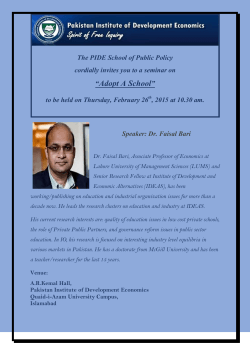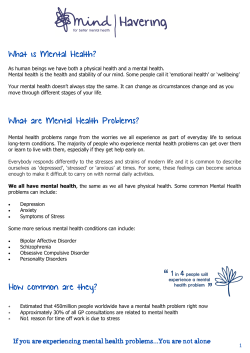
Why friends make good business partners...
NOVEMBER 2013 You’re not that innovative (and that's ok) Page 30 TECHNOLOGY How insurance can help you WhY friends make good business partners...or do they? survive a cyber attack The Magazine for Growing Companies Case Study Can an OEM build itself into a consumer brand? Page 42 Tanveer Saulat co-founder & GM, Synechron Page 39 The magazine for growing companies Faisal Husain founder & CEO, Synechron Why friends make good business partners... NOVEMBER 2013 | `150 | Volume 04 | Issue 10 A 9.9 Media Publication | inc.com Facebook.com/Inc ...or do they? PAGE 22 @inc BY Shreyasi Singh Design By SRISTI Maurya 2 2 | INC. | november 2013 PHOTOS.COM If building a business wasn’t a crazy enough ride, a growing clutch of entrepreneurs have made the journey even more exciting by partnering with friends from school, college or previous workplaces. The benefits are evident, and many—a shared risk, complementary expertise and companionship through a journey which can otherwise be punishingly lonely. Our cover story package delves into the crucial ingredients that make these relationships prosper, as well as the likely dangers that threaten to pull them apart. Befriending profits november 2013 | INC. | 2 3 Befriending profits With a little help from my friends Synechron 2 4 | INC. | november 2013 Hanging Out The three buddies, Tanveer Saulat, Faisal Husain and Zia Bhutta (from L to R), took the entrepreneurial plunge in 2001 and since then, have been reaping both profits and fun. I Befriending profits In 2001, Faisal Husain, Zia Bhutta and Tanveer Saulat founded Synechron. The past 12 years have certainly been a dream run. Synechron, a technology consulting and outsourcing firm with a specialisation in financial services today claims to have an annualised run rate of $200 million, a workforce that is 4,500-people strong, more than 100 clients, and offices in India, US, UAE, Singapore, Japan and Australia. It’s a future Husain and Saulat, who first met each other as teenagers in Bhopal in 1989, couldn’t have possibly forecast. A decade later, Zia Bhutta joined the gang when he worked with Husain in Dun & Bradstreet’s New York office. The seemingly fortuitous coincidence first took the shape of excited conversations about the aspiration to do something of their own. That, and the fact that they had similar industry experience (working on some of the first offshore engagements by financial services firm in the late 1990s) made them confident about taking the entrepreneurial plunge together. Their rapid success has validated that early confidence. The trio take us through the past decade, and tell us what it took to make their friendship work business wonders. Do’s Believe less is more Faisal Husain: Keeping your ego in check is possibly the most important thing to do when you’re working with friends. It’s also the toughest thing to do because most entrepreneurs by default are strong personalities. Yet, we realised that it is imperative to look beyond the “me”. Today, the three of us know we couldn’t have reached here alone. We are practical enough to understand the huge value each partner brings, and what the company can achieve when we are together—there are too many advantages to ignore. Also, if you have a similar value system, and similar personalities, managing this becomes easier. Because we were close friends before we became partners, we’ve had the time to validate that we have a shared value system. Communicate. A lot! Tanveer Saulat: We meet a lot. I live between Dubai and India. Faisal lives between Dubai and US, and Zia is based mostly in the US. At any point, two of us are likely to be in the same office. And, at least, twice a year, the three of us formally get together, usually in New York to talk about all sorts of issues. Before the meeting, we set out a formal agenda with six to seven key discussion points. We bring in our business heads/senior management to get their views and inputs as and when needed but this meeting is really about us talking. Doing this has ensured that there are very few occasions where we have big differences of opinion—maybe once in two or three years. Even then, these aren’t really a “difference” of opinion. Match well Faisal Husain: Beyond the personal connect, honestly evaluate your attitudes towards business. In our case, our financial styles matched. We had the same attitude towards debt and about investors. It’s why Synechron continues to be a selffunded company. All three of us were margin and cost-focussed from the word go. I’m not suggesting founders need to clone each other. On the big things though, your attitude should be aligned, even if your appetites differ. For example, my risk Expert view A Broken Band? V K Madhav Mohan has worked with all hues of leadership compositions—family businesses, husband-wife founding teams, and buddies-turned-entrepreneurs—in his role as a mentor and CEO coach. Mohan says he wishes he could be more optimistic, but firmly says that in his experience, the prospect of friends getting into business together, and making it big is bleak. “Very, very, very, very few people manage to do this because it takes an uncommon amount of maturity to manage these roles.” He takes us through his version of the evolution of most friends-cumbusiness partner relationships. It starts well enough, he says. Most people get together because of the friendship, and the trust that is at the core of that friendship. There is trust in the person’s character, integrity and bonafide intent, and also trust in the person’s competence. But, in a continuum relationship, what begins as an emotional connect eventually morphs into a business relationship. Almost always, Mohan asserts, this personal aspect tends to get eroded, and a hardcore, pragmatic interest takes its place, especially when the stakes become larger. People would imagine that discord emanates from the blame games of failure, but Mohan says success can sometimes be more damaging to relationships. “For example, when november 2013 | INC. | 2 5 Befriending profits Chain of Communication Don’t undervalue the importance of talking—a lot, believes Saulat. two friends, one who brings in technical expertise, and the other who is more of a strategy and markeing persone come together, and the business takes off. But, skills don’t always remain static. Imagine if the technical guy manages to come up to speed in other areas of business, it’s very likely for the turf war to get intense. In this example, mastering technology might be a little bit more difficult, so the strategy guy might be at a disadvantage suddenly. That changes the entire balance.” In most cases, these relationships become like bad marriages—alive to keep the children stable—but unhappy and unfulfilling. It’s not an ideal way to live, but a brave facade to hide the chinks is slipped on because the cost of separation is too high. Other threats lurk as well. Employees, Mohan says, can be extremely adept at playing politics, especially senior professional managers. Employees know how to exploit the “When friends become business partners, Mohan asserts, almost always, the personal aspect tends to get eroded over time, and a hardcore, pragmatic interest takes its place. This especially happens when the stakes become large.” different personalities founders bring. If one of the partners is a visionary, and the other a process, cost-oriented person, they know who to pitch their ideas to and for what. The only way friends, as well as family members who are in business together, can stay safe is by communicating constantly, and doing it very honestly. “See, everybody has a silo, and everybody has a power centre. Down the line—in the sales and the execution team—sometimes these silos are at loggerheads with each other, even if the big bosses pretend otherwise in public. Not enough organisations comprehend the huge opportunity cost they suffer because the management or founding team isn’t communicating effectively with each other. This directly impacts EBITDA.” 2 6 | INC. | november 2013 Well Matched Husain says its important for co-founder friends to have a similar attitude towards business. appetite is probably a little more than Tanveer’s and Zia’s. They are a little more cautious. We’ve used that well though—I’ve pushed them a little, and they’ve held me back a little. Because our goals are aligned, we’ve been able to do this. It’s important to ask yourselves — what are your personal goals on retirement, exit and the vision for the company. If these goals are different, there is a potential obstacle. What also helped is that we instituted the core separation of our roles and responsibilities very clearly from the beginning. Of course, these can change, and they have. For example, my partners are in charge of US Sales, but outside of the US, I have started taking on a lot more sales responsibilities as we try and go deeper into Europe and Asia. Let a leader lead Tanveer Saulat: When there is a group of founders, one person should be the designated leader. That person for us is Faisal. He’s the company’s CEO. We’ve given him that veto right, and did so very happily. We respect the position he holds. We are not shy about expressing our opinion, but Faisal has the lead. So, even if I didn’t agree to an idea at the brainstorming stage, once Faisal has taken the call to implement it, I would blindingly support him. I can’t remember any discord over such a decision be dragged unnecessarily for too long. Zia and I have the wisdom to stop debating once Faisal has made a decision. And, when a decision goes wrong, Faisal has the courage to come out and say sorry. Don’ts Get paralysed by analysis Zia Bhutta: Many entrepreneurs have a tendency to build on an idea, but not test it swiftly and effectively. You don’t want to build everything in one go. In a scale-up, fast-growth pace, you need to constantly test your idea, and not get trapped in an analysis paralysis mode. With multiple co-founders, this tendency to over-discuss and over-brainstorm is even more likely to happen, especially on matters of strategy, branding and structuring. Be conscious of that. Avoid getting caught in that web. Dwell on bad debts Zia Bhutta: One of the things that has worked for the three of us is that we are very good at writing bad debts off. We don’t agonise and dwell too much on what happened. I enjoy doing small experiments to test our ideas. Most are successful, the remaining might not be. But, we don’t sit and cry. We talk about what happened, and move on. Even when it comes to personnel issues—where we tend to have the most passionate debates—we live by the principle that a failure somewhere is a success somewhere else.
© Copyright 2025



















